Overview
NSA Data Mining Scandal is an ongoing controversy surrounding the U.S. National Security Agency’s telephone data-mining operation of millions of customers of Verizon, one of the largest telecommunications providers in the United States.
Background
On June 5th, 2013, The Guardian[1] published an exclusive report that the U.S. National Security Agency is collecting the telephone records of millions of customers of Verizon. The article detailed a classified order from the U.S. Foreign Intelligence Surveillance Court, which was obtained by the U.K. daily newspaper and made publicly available on its website[2], directing Verizon’s Business Network Services to hand over all “telephony metadata” created by the mobile service provider within the United States and abroad.
Image may be NSFW.
Clik here to view.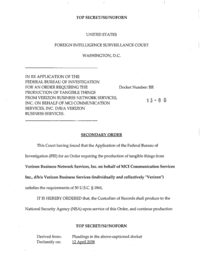 Image may be NSFW.
Image may be NSFW.
Clik here to view.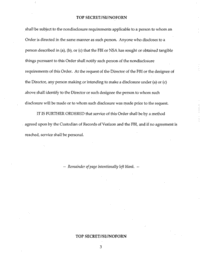 Image may be NSFW.
Image may be NSFW.
Clik here to view.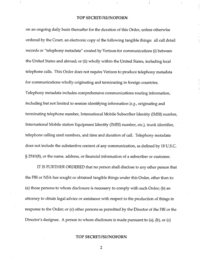 Image may be NSFW.
Image may be NSFW.
Clik here to view.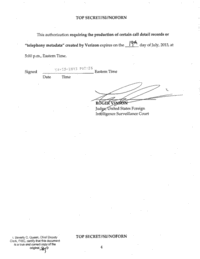
Notable Developments
The Guardian’s leak of the court document was universally met by criticisms of the Obama administration from both ends of the political spectrum, as well as news media outlets[4][5][8][9][10][11] and civil rights advocacy groups.[12] That same day, the New York Times[7] published an editorial titled “President Obama’s Dragnet,” slamming the president’s abuse of executive power, especially in the light of another recent scandal that the Justice Department secretly monitored the Associated Press and Fox News, and adding that the Obama “administration has now lost all credibility.”
Image may be NSFW.
Clik here to view.
On Facebook, The Guardian’s story was shared more than 103,000 times before 2 p.m. (EST) and the story was met by similar reactions of anger, confusion and even a few jokes about Verizon’s “share everything” plan and its ever-so-fitting catchphrase “can you hear me now?”
On Twitter
On Twitter, the original story published by The Guardian was shared more than 10,200 times before 10 a.m. (EST) while the hashtag #NSA immediately shot up to the top trending topic of the day, leading to nearly 250,000 mentions in less than 24 hours.
Image may be NSFW.
Clik here to view.
American actor Jason Biggs tweeted a joke referencing Verizon’s advertising catchphrase “Can you hear me now?”, which received over 330 retweets and 130 favorites in the first 24 hours.
“Can you hear me now?” – Verizon customers"Yep." – The U.S. government
— Jason Biggs (@JasonBiggs) June 6, 2013
Former Republican presidential candidate Herman Cain tweeted a sarcastic statement to Verizon customers, congratulating them on being spied on “without probable cause.”
Congratulations, Verizon subscribers! The NSA is spying on you without probable cause! bit.ly/1b8Uuhp
— Herman Cain (@THEHermanCain) June 6, 2013
Other Twitter users began posting jokes about the scandal with the hashtag #NSAcalledtotellme.
#nsacalledtotellme that my choice of DrWho over AmericanIdol was unpatriotic #watchingfordrones
— Nicholas Brown (@nicholasbrown85) June 7, 2013
PRISM Program
Also on June 6th, 2013, The Guardian[14] published an article reporting on a previously undisclosed government surveillance program called PRISM, which gives the NSA the power to gain direct access to search history, emails, file transfers and live chats from various Internet services, including those provided by Google, Facebook and Apple. The details of the program were revealed in a leaked PowerPoint presentation, which claimed the program was run with the assistance of the Internet companies involved.
Image may be NSFW.
Clik here to view. Image may be NSFW.
Image may be NSFW.
Clik here to view.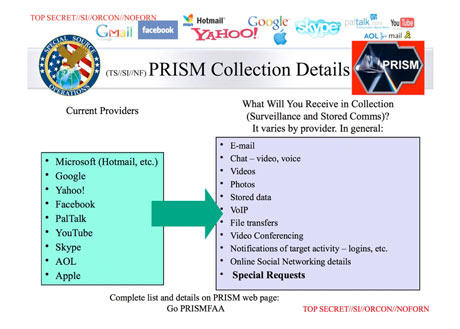
n response to questions about their involvement with the program, each company The Guardian contacted denied any knowledge of PRISM, including Google who released the following statement:
“Google cares deeply about the security of our users’ data. We disclose user data to government in accordance with the law, and we review all such requests carefully. From time to time, people allege that we have created a government ‘back door’ into our systems, but Google does not have a back door for the government to access private user data.”
The article noted that the program raised many concerns about due process, as it allows the NSA to directly access company servers to obtain information in complete secrecy. The director of ACLU’s Center for Democracy Jameel Jaffer criticized PRISM for being military surveillance of civilians:
“This is unprecedented militarization of domestic communications infrastructure. That’s profoundly troubling to anyone who is concerned about that separation.”
On June 7th, The Guardian[15] published a follow-up article, reporting that the United States Director of National Intelligence James Clapper confirmed the existence of PRISM, but insisted that it only covered surveillance of communications with foreigners, not United States citizens.
President Obama’s Response
That same day, President Barack Obama held a press conference in which he defended the surveillance programs, arguing that they did not apply to United States citizens, were subject to Congressional oversight and required the authorization of federal judges (shown below).[16]
Notable Examples
Image may be NSFW.
Clik here to view. Image may be NSFW.
Image may be NSFW.
Clik here to view. Image may be NSFW.
Image may be NSFW.
Clik here to view.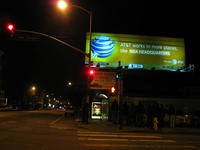
External References
[1]The Guardian – NSA collecting phone records of millions of Verizon customers daily
[2]The Guardian – Verizon forced to hand over telephone data – full court ruling
[3]New Yorker – A LETTER TO VERIZONCUSTOMERS
[4]New Yorker – THE N.S.A.-VERIZONSCANDAL
[5]Google News – Stories about NSA-Verizon Scandal
[6]BuzzFeed – Help Us Reimagine Verizon Ads
[7]New York Times – President Obama’s Dragnet
[8]Washington Post – Obama administration collecting huge number of citizens’ phone records, lawmaker says
[9]Politico – Left, right radio fume at NSA report
[10]Washington Post – U.S. intelligence mining data from nine U.S. Internet companies in broad secret program
[11]Los Angeles Times – NSA, Verizon surveillance program: What you need to know
[12]Electronic Frontiers Foundation – Timeline of NSA Domestic Spying
[13]USA Today – Report: NSA siphons data from 9 major Net firms
[14]The Guardian – NSAPRISM program taps in to user data of Facebook Yahoo and others
[15]The Guardian – Clapper admits secret NSA surveillance program to access user data
[16]The New York Times – Obama Calls Surveillance Programs Legal and Limited